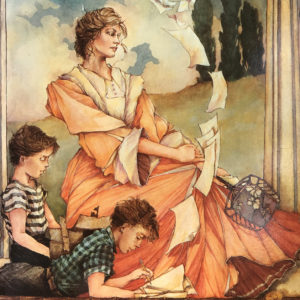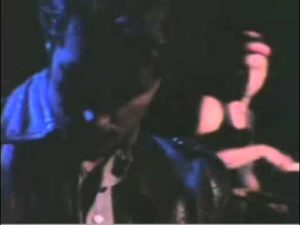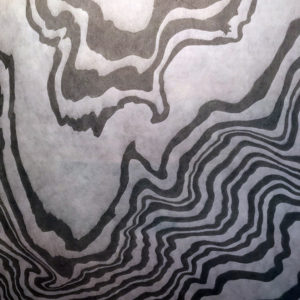Ray Bradbury may have been my first favorite writer. I loved reading his stories when I as a kid, and I was so excited to read The Martian Chronicles when it was assigned to us in sophomore English class at Deerfield Beach High School. Years later, when I was a student at Florida Atlantic University, Mr. Bradbury came to speak there; from that evening in the large, packed auditorium I remember two things: a bit of confusion in the pre-lecture small talk amongst the two strangers sitting in the row directly in front of me (“You’re a ballet dancer?” “No, a belly dancer.”) and I remember a story that Mr. Bradbury drifted into, a tale about a father and his young son going to Gettysburg to hear Abraham Lincoln speak. President Lincoln had traveled there of course to dedicate the Soldiers’ National Cemetery on the site of the battlefield and to deliver a short speech, which would become known as the Gettysburg Address. But the boy and his father arrived to find the crowd was thick and that they couldn’t get very close, so it was tough to see what was going on and difficult to hear what was being said. The kid’s dad hoisted the boy up on his shoulders so at least one of them could see and hear better. The boy, from his new vantage point above the crowd, could take it all in, and then he became a beacon himself, taking in each word of the speech and retelling it to his father and to those around him. And so instead of hearing Mr. Lincoln speak, the man heard the Gettysburg Address through his son, who became a reporter of sorts, receiving the story at this important moment in history, sending it back out to the world.
This is kind of the way I tell my stories, too. I don’t really have the imagination that Mr. Bradbury had. I just see things, hear things, receive them and take them in, let them mull about in my head a while, and when the time is right, I remind people about them before they are gone forever. This, anyway, is how I’ve come to see my job as a writer.
These things––my appreciation for Mr. Bradbury and these memories about my encounter with him back in 1991 or so––they have been dormant in my mind for a while now, years and years, but then just last week, before the Fourth of July, it struck me that it was most definitely summertime, and the thought brought me to the bookcase, where I made short work of locating an old dimestore paperback copy of his novel Dandelion Wine, a book that chronicles the summer of 1928 as experienced by a 12-year old boy named Douglas Spaulding in a small town in Illinois. I’ve read this very same book two or three times before, always in summer. The pages, I think, were yellowed even back then, and now I am reading it again. As Douglas records all his summer firsts in that summer where he first felt alive, he’s gotten me thinking about all my own summer firsts this year. First realization that the lawn at Mom’s house needs a weekly mowing rather than biweekly: June 5. First ice cream of the summer: the ice cream cake that my sister made for my birthday at the start of the month. First apricot: just this past Sunday afternoon. Not one mango from our own tree this year (the few we had all went to the squirrels or raccoons), but the first mango this summer from the Jewel Mango that we planted for my dad on one of his birthdays, that, too, was in early June. First acknowledgement of full-on mango inundation: that may have been June 12 or June 19. It was a Tuesday, that much I do recall. It was the first day my mom and sister complained of peeling mangoes and prepping them for the freezer; they began at that point to give them to anyone who would take them away.
It will be known as the summer the fireworks were washed out, for the Fourth began sunny and hot as any summer day in Florida, but by cookout time there were clouds building, as I grilled the burgers and the sausages my mom and sister brought. We ate them with salad and watermelon and then, just about a quarter to nine, as Seth was getting out the wooden folding chairs for our trip to the lagoon to watch the fireworks, the thunder began and then soon after the skies opened up. It settled down eventually to a drizzle and soon we could hear the booming of the fireworks and sure enough, just over the neighbor’s trees, we could see them light up the sky and so we ran out to the street and stood there as the rains picked up again, which was fine as more and more neighbors did the same, saying Oooh and Ahh with each exploding shell, until the one that exploded and shimmered and was perfectly accompanied by a flash of lightning that lit up all our faces and made us all say Oooh and Ahh much louder than before. The second lightning flash was enough to send us all scurrying indoors, and the fireworks ceased, only to be started up again and abandoned again, until the whole thing was called off. What we got, though, in this July Fourth without a fireworks grand finale, was awfully nice just the same.
And it will be known as the summer that Bob the electrician suddenly left this world. He and Seth were planning on some work here at the house and at a friend’s house this past Saturday, and they had been communicating via text message up until Friday night. Saturday morning, Bob said, he would call. But he never did. We found out from a mutual friend that he died that Friday night of a heart attack. A young man, by standards of how we measure things today and as far as expectations of things like this go. Reminding us that we are indeed to love each day we have, to not hold grudges, to be kind and loving as often as we can––all things that seemed to aptly describe him. Plan all you want, at the end of the day, well… still we know nothing.
It is the summer that I spent Tanabata, the Japanese Star Festival, teaching eleven people about suminagashi, the traditional paper marbling craft of Japan. It goes back to the 12th century, this technique of floating sumi inks on water, using the breath to gently coax concentric circles of ink and white space into patterns that then are printed onto paper. When we scheduled the workshop at the Armory months ago, none of us at the time realized it was going to fall on the Seventh Day of the Seventh Month, but it did: Tanabata, the July 7 holiday of Japan, based on the stars Altair and Vega, in which we write wishes on paper and tie them to the trees. And so while my students practiced their new craft, I set some type and near the end of class, we each printed the word “tanabata” on strips of suminagashi papers, wrote wishes on them and tied them to the thatch palms outside the studio. Had I known about Bob at the time, I would have made a wish for him.
First trip to the beach: It hasn’t happened yet. First listening to Felix Mendelssohn’s A Midsummer Night’s Dream: June 16. First listening to George Winston’s Summer: also June 16. As for the Gerswhin Brothers’ lullaby “Summertime,” it was June 23 for the Ella Fitzgerald & Louie Armstrong version; July 5 for the Peter Gabriel version, rich with harmonica, which, in my head, thanks to an old mix tape I made in the 90s, segues always into the Syd Straw version of “Blue Shadows on the Trail,” and this has been my summer soundtrack since. Thanks to that same harmonica backing, Syd’s “Blue Shadows” is full of dark and beautiful mystery simmered in the heat of summer. If you pass me on the street these days, chances are good you’ll hear me whistling the tune, or maybe even singing it, because I do like to sing, something I learnt for the first time in another summer: the summer of 1996, during my first printing internship at the Sabbathday Lake Shaker Community in Maine. Seth and I would go to Shaker Meeting on Sundays and sing Shaker spirituals with Sister Frances and Brother Arnold and all the other Shakers and all the other visitors like us, from “the world,” as the Shakers like to say. First time this summer missing that place, the place they call Chosen Land: July 3; same day I first felt a little wistful, too, for Penland, the craft school in the North Carolina mountains where Seth and I first met.
First sighting of summertime clouds: I don’t know that I even noticed that this year. In Florida, summertime is rainy season, and it began raining this year in May and it didn’t stop for weeks on end, which is not the usual way it goes. Usually the rains come each day in the afternoon after the clouds build, out over the Everglades, before they drift to the coast. That pattern is happening now, but I couldn’t tell you this year when it began. This summer, we just sort of meandered into it. Those clouds, though: they are beautiful, no matter how or when they arrive.
First book I began this summer: Parallel Universes by Fred Alan Wolf. It makes my head ache and blows my mind at the same time, makes me feel like anything is possible. I began reading that book just before Midsummer, so maybe it was June 18 or so, and I’m still not done with it, and yet I’ve picked up that paperback of Dandelion Wine, too. But I like having multiple books in progress at any given time. The book about quantum physics was getting a little intense, and summer’s lightness was beckoning and suggesting to me a different kind of story, a familiar one. Dandelion Wine has been just right. First observation of cicada song: July 7; again, Tanabata. Fitting, as the cicadas hang out in the trees just as the wishes do that we hang in them. As is the nature of cicada song, once I heard it, it was all I could hear. Such a small creature that emits such a heady song. Hearing it here in this strange green land means that summer is waning. The hottest days of summer are still to come but we know they’re growing shorter with each that passes. Here we are already three weeks past the solstice, each day a bit shorter than the one before it, a process that will continue all the way to the solstice of Midwinter. And the Earth spins and continues its journey round the sun in the vast celestial clockwork that keeps everything moving just as it is supposed to, while we are here to observe these things, and certainly well beyond that time, too.
Image: Detail from the cover of my 1990 paperback copy of Ray Bradbury’s Dandelion Wine. The cover art is by Tom Canty.


